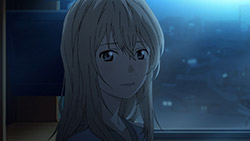 |
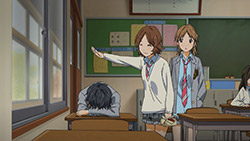 |
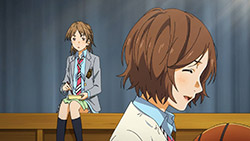 |
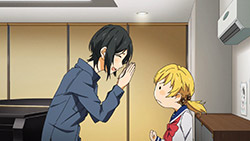 |
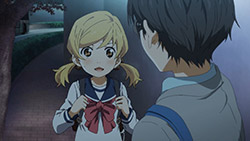 |
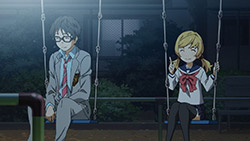 |
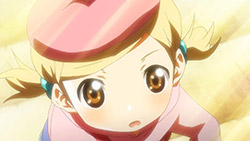 |
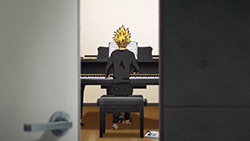 |
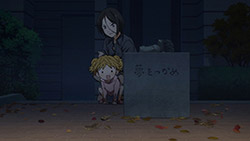 |
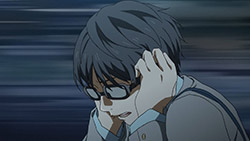 |
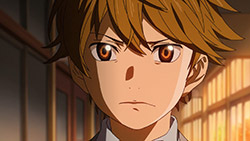 |
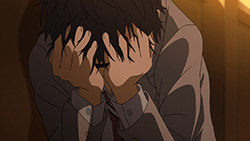 |
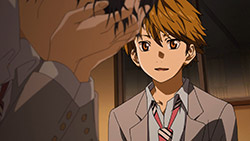 |
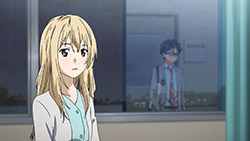 |
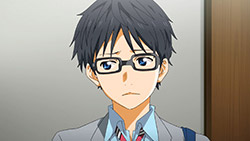 |
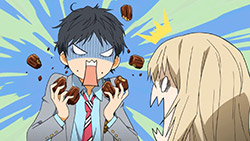 |
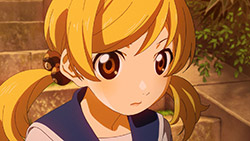 |
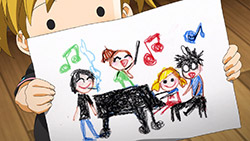 |
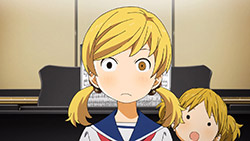 |
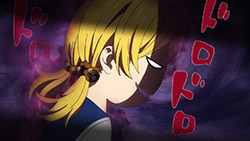 |
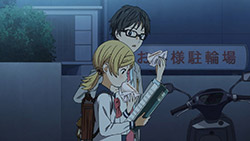 |
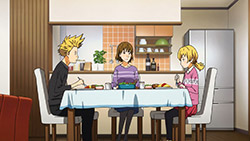 |
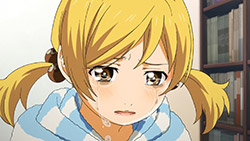 |
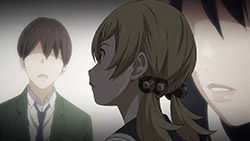 |
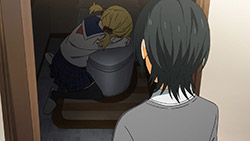 |
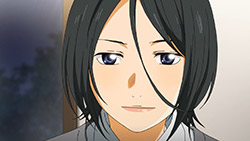 |
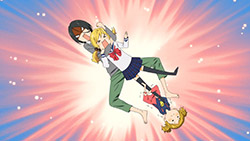 |
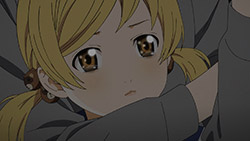 |
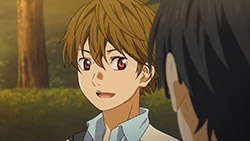 |
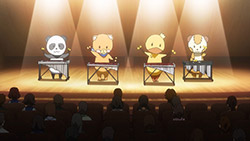 |
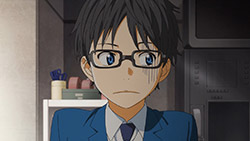 |
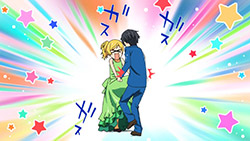 |
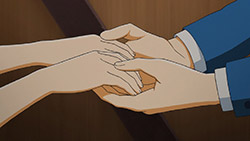 |
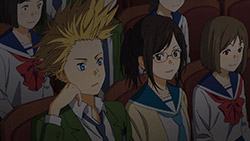 |
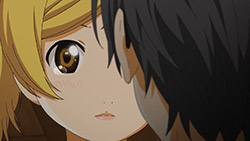 |
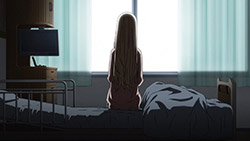 |
「トワイライト」 (Towairaito)
“Twilight”
Today’s episode title, ‘Twilight’, concisely summarizes the feeling of today’s episode. Everyone is in a tough spot right now; Kaori is on the brink of losing all hope, Nagi faces ever-mounting pressure and waning self-esteem, and Tsubaki struggles to identify and come to terms with her self-created walls. Kousei and Hiroko are haunted by the past repeating itself, Takeshi continues to be shaken by failure, and even Ryouta probably is struggling to accept his true fate as the real background character. Most everyone in the series is going through their moment of twilight, but it is now future episodes that’ll dictate whether it’s the twilight leading to a sunrise or an unfortunate sunset. Let’s tackle the main issues today one by one.
Pavane for a Dead Princess
The elephant is finally called out, where Kousei has no use denying it anymore. Kaori is dying, not just in a physical sense, but as a character as well. Without her outlet of music to fuel her reason to live and definitely without physical strength to even hold the bow of a stringed instrument, our once cheerful musician has seen her lies finally collapse, where fooling anyone has become more a strenuous effort than a means to escape pain. Although she’s still able to conjure up smiles and a violent personality as before, these moments are fleeting and only serve as a mere few seconds of escape before being reminded of her situation. There isn’t much to say that has been said already about Kaori’s character at this point, except that it must be hard for her to face Kousei now, despite her clear desire to see him again. If she sees him, she’s reminded of her inability to play music and the love she can’t accept. If she doesn’t, her longing for companionship intensifies, furthering the isolation that she feels from the rest of the world. Lose-lose everywhere, death flags everywhere, it sucks to be Kaori.
Repeating Sorrow
As a result of Kaori’s impending doom, a chain reaction leads both Kousei and Hiroko to face the demons of their past. For Kousei, there isn’t much in his power to change his fate. There was nothing he could do to save his mother, and as such that same feeling of helplessness kicked in today as well. It seems proper that the “Pavane for a Dead Princess” was the haunting melody in Kousei’s head, symbolic of his inability to run away from the truth. In order to fight these feelings, the Kousei of two years ago tried his best to fulfill his mother’s wishes, perhaps in hopes that doing so could save or help his bedridden parent. Although that didn’t pan out so well the first time, Kousei is once again facing his despair head-on to help Kaori. The difference here is that he isn’t fulfilling any one specific request to appease someone. Instead, Kousei is hoping to grab Kaori by the hand and give her the hope she desperately needs, through the cliche power of music. It’s fulfilling to see Kousei ‘giving back’ to the person who brought him back to music, though bitterly hopeless it seems at times.
Meanwhile, Hiroko is also facing her own repeating mistakes as well, with Nagi reflecting a younger Kousei. However, this is well within her realm of control–she literally grabs onto the opportunity to set things straight and give Nagi some real talk. Seeing Hiroko paralyzed two years ago at a crying Kousei was understandable, but what’s great is that her action today reflects an all-too-real desire to never see such a sight again. With Hiroko’s direct personality, the whole scene fit rather well, nicely complimenting the repeating history theme that was played at today. Just as Kousei indirectly reminds Nagi of the mutual solidarity that musicians share, Hiroko faces the scene head-on, unwilling to see another student crumble under stress that they can’t overcome alone. We’ll talk about this theme later, but the bonds between fellow musicians are indeed powerful, enough so to overcome the stress and sense of failure that accompanies any performance.
Guilt and Relief
Poor Tsubaki. It isn’t just today that she’s felt a guilty relief; her whole life with Kousei has been a love-hate relationship with music. In the past, it was music that took Kousei away, but Tsubaki knew fully well that Kousei without music just isn’t Kousei. Now that Kaori is in the equation, the same guilty rules apply. She’s damned if Kousei and Kaori get together without a hitch, and she’ll feel guilty because Kousei is sad if troubles arise, with guilty feelings arising in the process. It’s an all too commonplace feeling in everyday life; we honestly wish for the success of people close to us, even if that success may silently hurt us emotionally. What of the friend who keeps getting promoted at work, the unrequited love interest over heels for another, or perhaps even the child who surpasses what you could have ever done. It’s a sad mixture of two conflicting sides: the supportive role that wants to see someone happy, versus desires and jealousy to be a larger or more central role to that happiness. These are very complex feelings for our early selves to understand, so today we see Tsubaki consciously breaking down these conflicting feelings and trying to make sense of them, a sometimes futile effort. On the bright side, this conflict might bring the kindling for Tsubaki to confess. There are still a number of episodes left, so I’m crossing fingers here that Tsubaki will finally start moving like the rest of the cast and get things rolling, even at the cost of Kaori’s feelings.
Solidarity in Music
However, of all the moments we’ve witnessed today, the penultimate scene with Nagi and Kousei took the episode in my books. The scene itself was fairly simple–Nagi and Kousei are freaking out as they usually do–but it was when they held hands briefly that really took it away. No, I wasn’t shipping them hard, but it was a subtle, yet symbolically important gesture that I could relate to as a former piano player. For all of the musicians in this series, none of them work in isolation to become the best. Whether they like it or not, by performing publicly they implicitly join a community of musicians, both with the fellow performers onstage or the audience watching in earnest. Despite this fact, it is natural to believe that your worries about the stage are limited only to yourself. After all, what most people show on stage is a beautiful five to ten minute performance, rather than the hundreds of hours of practice that went into that piece and the stress and loss of hope that comes with it. Thus, when Kousei took Nagi’s hands into his, you could see both the physical and emotional connection being made as they both trembled. For Nagi, she saw firsthand how hard Kousei worked to perfect his part of the arrangement–being reminded of that most likely gave that sense of solidarity that gives one confidence to move forward. It is scenes like this that show mutual respect and trust between the characters that has carried Shigatsu’s finest moments. With another performance imminent, I look forward to seeing how the show can wow us next week with two musicians in tow.
Preview
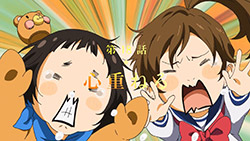 |
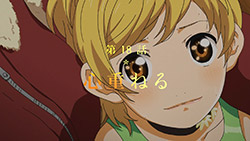 |
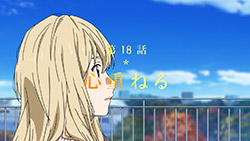 |

Each episode that goes by and I just see that final feels-cannon charging up to maximum levels and I’m not ready for it….
Nope, there aren’t enough tissues that will prepare anyone for the inevitable doom and gloom tsunami that’s about to hit shore.
I remember a ton of posts back I called Kaori an asshole… can I take that back? Yeah she’s abrasive as hell, but watching her get fleshed out even more and practically sitting through her sickness with her bit by bit is pretty heartbreaking. As a musician (to some degree) myself I’d be heartbroken if someone told me I wouldn’t be strong enough to play my trumpet (it’s collecting a bit of dust right now…so I think I’m gonna go buy some valve oil thanks to this episode).
Gotta feel for Nagi too, all that bravado and nobody can see it’s a facade that a scared girl with tons of pressure resting on her shoulders. Pressure to impress her friends, fans, and enemies (seriously…little girls are the devil. “She’s not even that good/cute/etc.”??? Really bitch? Sigh) and she’s supposed to just take all of that in stride? I can’t wait to see them kill it after all the support she received from Hiroko and Kousei.
Hell, I even feel bad for Ryouta! He realizes how ultimately irrelevant he actually is. That sucks.
Tsubaki…idk still can’t like her, but I feel for her. Though, at this point something tells me she’ll come around to confessing and being content with being the childhood friend that’s always there for Kousei. I also don’t find it to be in her long-term best interest to be with Kousei, she’ll just end up having to deal with Kousei being taken away from her by music a lot more and I don’t think that’s something she’ll ever truly be comfortable with enough to always let happen. Especially when she has her own dreams to look forward to, what happens when/if softball begins to take her away from Kousei?
Deep stuff…I’m glad I didn’t deal with even a fraction of this stuff at age 14
The overuse of crying is killing the impact of this show’s somber moments for me. When tears are used so much to elicit an emotional response it becomes desensitizing to other developments that might be even more meaningful. Or maybe I’m just a sociopath who just doesn’t feel anything anymore.
A show about young musicians trying to make their dreams a reality?
Sorry, if I saw any less tears I’d be sitting here like ‘fake, illogical, not realistic’
No no no, what could end up killing this show is the writers placing stupid jokes where serious moments are happening. Thankfully again, this episode didn’t have any. So i’m not understanding where someone crying in any of these scenes dulled the emotion of another. I could understand if you thought Nagi’s tears/butterflies prior to her performance seemed overused.
They most definitely are not.
Performing musicians know the feeling and they can understand what’s going on when they see another musician shaking before their time slot.
You either know it or you don’t. Simple as that.
I really do wonder what the appeal of these dying girl “feels” stories are to people cause to me I was enjoying the story way more when it was about the music aspect of things. Melodramatic stories about dying magic pixie dream girls or just dying girls in general are kind of a dime a dozen in Japanese drama anime and Japanese drama in general, but stories about musicians and music and their journey’s in that area aren’t really which is what first attracted me to the manga this adaptation is based off of. I wouldn’t exactly the say the show feels like it has “forced” drama or anything like that as some do (I don’t really have a solid definition for that sort of thing anyway), but it’s certainly steered into at the very least more typical and commonplace territory for drama anime in it’s final act.
This series is anything but subtle. I had high hopes for this, but the over use of forced drama is killing it. They are literally doing everything they can to get us to love a character that has a 99.9% chance of death.
Forced drama?
What forced drama?
They had been subtle for about the first 10 episodes, if they were still being subtle about a life threatening illness with 7 episodes left I’d be pretty confused.
Don’t see where they’re trying to force anyone to like Kaori, if you don’t like her that’s up to you. Fact is she’s dying, she left a huge impression on this trio and now they dunno how to cope with any of it. Especially considering they’re 14.
Kaori <3
Maybe it’s just me, but I feel like you and I are watching two different shows.
“forced drama” best way to describe this show.
Having read the manga I love this arc. Seriously good stuff. Nagi is great. Biggest issue is Tsubaki still is acting as filler for the series.
The KouseixNagi train is leaving the station. Next stop… Only In Our Dreams.
Kaori and Tsubaki suck. The only good girls (Nagi and Emi) are relegated to side character status.
You forget Koharu (Hiroko’s little daughter) in that list of good girls. Her adorableness is a breath of fresh air 🙂
Hands down to Kousei for holding it in
If I experienced the same thing I don’t think I can handle it
It’s Kousei’s turn to help Kaori now <3
I already see the “forced drama” accusations being thrown.
I believe it’s more the fact that some people are far too used to “not-serious-enough” drama. A lot of “drama” for the past few seasons has usually been pretty tame and/or solved unrealistically quickly or something, so having drama like this, where it’s NOT solved quickly and/or happily, and actually touches on thoughts and issues that many people can truly relate to in some way is something that comes off far more heavy than they’re used to seeing in anime. It feels like such people think such drama never/can’t happen outside of “darker” anime or something, so seeing a usually brighter-looking anime like this, they expect “drama” to be something like “boy and girl have a fight, now they have to solve it and be friends/get back together again with comedic hijinks along the way and everything ends bright and cheery” and not have anything to do with death, trauma, depression, etc.
They want forced drama? Look at Kirito’s PTSD in the GGO arc of SAOII.
I’m kind of on the fence with drama in the story; it feels realistic most of the time because its showing how Kousei is experiencing the same pain that he felt when his mother died, and with how Kaori is slowly dying, you can really feel the stress that Kousei is feeling when he sees someone who loves music as much as him fighting for their life but they’re slowly dying inside. On the other hand, I wish that the mangaka would state what kind of illness Kaori has; it would help with understanding how what her disease and I think help with the immersion of the tension that is building up in the story. Additonally, it might not be the matter of the intensity of the drama but rather how its used. I love how it works to propel Kousei and his friends as they’re are trying to find their future while worrying about Kaori’s, but in the back of my head, her illness feels out of place, like they could have foreshadowed Kaori’s disease, maybe provide hints from her parents, or show a flashback of Kaori experiencing the symptoms of her disease for the first time and then letting her say her thoughts and fears (I feel her collapse in the concert was sort of awkward). Other than that, the drama is not the best, but it works to develop the characters and pull certain emotions out from the audience.
This is something i tried to explain in my earlier post but i didn’t elaborate and just blurted out some nonsense. If you can empathize with a character, it makes the show that much more meaningful. Nagi’s tears can seem realistic to some and to most, it just seems like the writers went a little overboard with them.
That being said, i don’t see any forced drama here. That’s just the way it is. It all depends on how you relate the story to your own. Can you empathize with any of the characters? If you can’t then i can understand why some of the plot is just ridiculous.
For me, those claiming “forced drama” in a show like this are the same people who criticized this show in the beginning for attempting to take itself “too seriously”. After half a season of subtle hints, we have finally gotten to an important part of the series. How has it been forced on us as if we didn’t know where it came from? We didn’t just start watching this series from episode 17. I can understand if someone started watching the show and was met with Kaori’s Show Spoiler ▼
question and they saw the “well that escalated quickly” meme pop up into their head.
This is drama. This isn’t like the anime we’ve been spoon fed with that “moe” flair that everyone is used to. Adding to what HalfDemonInuyasha said above, this cheery setting can fool people into thinking they signed up for a different sort of show than what they are used to. Kind of reminds me of Shuffle!, in the same sense that it’s cheery and happy for the first 2/3 of the show but then when stuff hits the fan, you can feel it. The same can be said with True Tears, Clannad, Spice and Wolf, Kimi no Iru Machi, etc…
I think people are finding the drama to be forced because it is actually pretty melodramatic.
Melodrama isn’t bad, but it is hard to take in strides… many conflicts of the show had exaggerated dialogue (no a 14 year old normally won’t be so openly poetic unless there is a Japanese cultute shock thing going on) and it probably will continue.
Now, not saying it’s forced, mind you, but this show definitely has a lot of shounen angst goin’ on. (And not all of it is melodrama I concede, just a lot of it which can initiate different reactions)